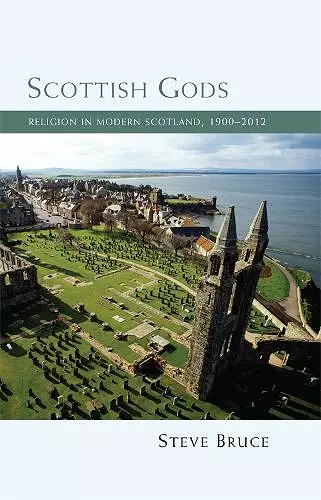Scottish Gods
Religion in Modern Scotland 1900-2012
Format:Paperback
Publisher:Edinburgh University Press
Published:11th Dec '15
Currently unavailable, and unfortunately no date known when it will be back

Steve Bruce here presents a highly readable account of the changing nature and place of religion in Scotland in an increasingly irreligious society. In 1900 Scotland was a largely Presbyterian country and the Christian churches were a major social force. Now less than 10 per cent of Scots attend church. As religion has declined, it has become more varied: Catholicism has grown as have Charismatic Christian fellowships; Buddhist and Hindu themes have ‘easternised’ our religious vocabulary; a significant Muslim population has become established; and a notable number of Scots now pursue personal spiritual interests in forms which would once have been dismissed as pagan. Both this decline and the diversification deserve explanation. The Protestant-Catholic divide has faded but Scots have new controversies over the proper public place of religion in the light of growing secularization and diversification. The growth of individual liberty and increasing cultural diversity combine to weaken all shared beliefs by changing religion from a social matter into a private personal concern. All religious groups are faced with the choice of either accommodating that trend and losing their distinctiveness or resisting it and making membership too costly for most potential adherents. This radical remapping of Scotland’s religious character is a fascinating summary of a remarkable career of research and analysis by one of Scotland’s leading social historians. Topics include: Lewis, Orkney and Shetland compared; the integration of the Irish; the growth and decline of the Catholic Church; Scotland Orange and Protestant; the Post-War Kirk; factionalism in the conservative Presbyterian churches; the failure of the charismatic movement in Scotland; Samye Ling and Buddhism; Findhorn and New Age spirituality; Scots Muslims; and arguments over the ordination of women and gay rights.
Whilst the author’s arguments on sectarianism should be familiar to any well-informed reader, the originality of this book lies in melding such material with the breadth of the historical perspective and the range of topics. This gives a very original mix, from sectarianism to shamanism, from the Auld Licht Anti-Burghers to Findhorn’s fairies . . . this book represents ‘the latest word’ in the critical study of religion in Scotland. * Michael Rosie, University of Edinburgh *
ISBN: 9781474408400
Dimensions: unknown
Weight: 400g
256 pages